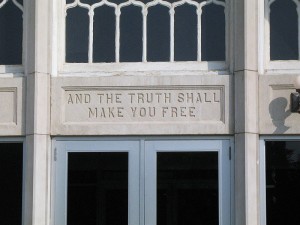 Showing Christ to be relevant in a postmodern, largely secular society has its share of conundrums. I will say upfront that I am not an expert on postmodernism; the following are simply my observations of being a follower of Jesus in 21st century Melbourne, as well as some insights picked up from other followers on the way.
Showing Christ to be relevant in a postmodern, largely secular society has its share of conundrums. I will say upfront that I am not an expert on postmodernism; the following are simply my observations of being a follower of Jesus in 21st century Melbourne, as well as some insights picked up from other followers on the way.
I have a deep conviction, and in fact I can say – and I understand that this will seem like an incredibly arrogant assertion to make in a postmodern culture – that I know that Jesus is the answer to the question of life, of what it’s all about and how we deal with it. He is the only one who delivers on the life that humanity is after. This conviction has been borne out of years of surrendering my life to this Christ, asking for His will and not my own to be done in my life each day. As C.S. Lewis said, “I believe in Christianity as I believe that the sun has risen: not only because I see it, but because by it I see everything else.” You can’t prove that by the logic of reason, and that is one of the benefits of bringing across Jesus today. Many people are not seeking ‘proofs’ these days. As John Smith has said, you could convince someone that Jesus really did rise from the dead, but they could at the same time turn around and say, ‘so what?!’.
People want to know that Christianity works. But whilst it is important to bring that across, it is equally important to remember that Christianity isn’t true because it works; it works because it’s true. Again, this will come across to many people as another seemingly arrogant assertion to make. But I learnt from Rikk Watts some time ago, and I agree with him, that truth is something different to what I had always thought. In these postmodern times where what’s true for you doesn’t have to be true for me, I believe we have forgotten what the definition of truth is. I believe we have been looking at it the wrong way. We are still caught in the trap of our post-Enlightenment thinking that sees truth as a concept. But the Scriptures never describe truth in such a way. Have a read through John’s gospel and you will see it. Truth is personal. The truth has come to us in a Person, the person of none other than God incarnate. A concept is impersonal, and truth is not that.
When talking about truth we have been asking the wrong question. Ever since Pilate asked Jesus that great existential question, ‘what is truth?’ (John 18:38), we have thought of truth as a concept. But John tells us that truth is a person. Jesus said I am the way, the truth and the life (John 14:6). And John in his gospel says that the law was given through Moses, and grace and truth came through Jesus Christ (John 1:17). This Truth is the great ‘I Am’, a designation that the Jewish hearers of Jesus would have instantly recognised as nothing other than the outrageous statement of someone who is claiming to be the living God. No wonder they tried to kill him. How dare he make such claims in front of those who claimed to have a monopoly on truth!
I wonder how society would react if He made those claims today. I don’t think it would be much different to 2,000 years ago. We live in interesting times. While we live in a time when modernity seems a relic of the past, there are still strong glimpses of it. People know integrity when they see it. You will not meet many people have major problems with the church who will also write Jesus off. As Dan Kimball has noted in his book of the same title, ‘they like Jesus but not the church. And, as N.T. Wright says, “we generally know deep down what is good. When we see someone living out a Christian life, we don’t ask ourselves if it’s good or not; we just wish there were more people like that around.”
Throughout the ages, from modern days to these postmodern days, actions still speak loudest. If we want to find out whether or not Christian faith is relevant in the 21st century, we need only look at the actions of those Christians who are walking their talk. The fact is that Christians have had a profound impact on society. I have written elsewhere of the massive contributions that people of faith have made over the centuries. It is that more than anything that has convinced people of the reality of God in the world.
If we want to see what Scriptures speak best to a postmodern culture, I think the relevance of Christ today is seen most profoundly in those magnificent words of Colossians 1:15-20. This is what brings it all together for me. Check it out:
The Son is the image of the invisible God, the firstborn over all creation. For in him all things were created: things in heaven and on earth, visible and invisible, whether thrones or powers or rulers or authorities; all things have been created through him and for him. He is before all things, and in him all things hold together. And he is the head of the body, the church; he is the beginning and the firstborn from among the dead, so that in everything he might have the supremacy. For God was pleased to have all his fullness dwell in him, and through him to reconcile to himself all things, whether things on earth or things in heaven, by making peace through his blood, shed on the cross.
I think this is one of the most radical passages we can think of for the 21st century. He is before all things, and in him all things hold together. And, contrary to popular church opinion, God did not make everything for our glory. Colossians tells us that it was all made for Him. The creation and all that is in it was not made for us. We don’t own it. We are stewards, and stewards take care of what they have. If the church would only grasp this and get over its mind-numbing superficiality and obsession with growth and success, we would be more of a fragrance of life than a fragrance of sameness and conformity. And we would actually have something powerful to say to a society that is drowning.
We need to be more aware that society has largely given up on modernity and its failed promises of the good life and inevitable progress. But, as alluded to above, people still want to believe in something bigger. Witness the extraordinary outpouring of hope in Barack Obama in 2008. It’s interesting that such an outpouring of emotion and hope occurred in a country with Christian roots, nominal though its Christianity generally is now. It has largely been overtaken by a consumerism that has taken it to the eve of destruction, as Barry McGuire put it so many years ago.
In such a consumerist society, with so much choice, we suffer from choice anxiety. When our only commitment to life is the commitment to – in that postmodern catchphrase – ‘keep our options open’, we become confused people. We become terrified of missing out because we’re addicted to experience. As a result of this we become wired, unable to settle with being committed to something for the long term. That’s why I think Facebook has taken off like it has. It is a service that both reflects and shapes our times. On the other hand, as I have said previously, it is why marriage is so good for the soul: it’s about a commitment for life to one person.
When we ‘keep our options open’, we rarely take up any of those options and we miss out on much of the joy of being alive, of standing for something, of living with purpose. The line from a John Mellencamp song from the 1980s rings true today more than ever: “if you don’t stand for something you’ll fall for anything.”
Having said all this, some thinkers, notably Mark Sayers, believe we are moving away from postmodernity back into something more akin to modernity. Sayers adds though that while there has been a decline in the concept of postmodernity in the wake of 9/11 and the rise of the ‘New Atheism’ with its modernist catchcry of ‘celebrating reason’, the reality of postmodernity is being lived out by average people in the suburbs. Consider this comment by Sayers:
“Postmodernity is seen most clearly in the ethically incoherent lives lived by Western people. Its beat of relativism is heard most clearly in the contradictory hedonistic/altruistic, nihilistic/optimistic, spiritualistic/materialistic lifestyles of average people everywhere in the West.”
Sayers goes on to say that therein lies the challenge of mission in the 21st century. We do well to remember that postmodernism too has made the same mistake as the church. It too still has traits of modernism about it in that it still sees truth as a concept. It just sees truth as relative instead of absolute.
Whilst in our conversations, the use of modernist concepts like reason (an essentially Christian idea by the way) and logic can have its place, there is a challenge to be given to those who live a contradictory lifestyle. But the challenge first has to be faced by people like me who often decry the subversive effects of the very materialism we secretly still hang on to at times; in my case the very technology I secretly want more of. We too need to walk our talk. That will speak louder than anything.
I wonder if we have let ourselves be walked over by the claims of postmodernism. Can we say that truth still has a claim on the hearts and minds of people today? Can we talk about truth in a world where there is no meta-narrative, no greater over-arching story anymore? We can, but only if we remember the nature of truth, that truth is a Person, that it is about relationship, something that goes to the very core of our identity as human beings. Jesus never spoke in abstracts; he told stories, and people respond to stories because there is usually something in them they can relate to. The Christian message is a story. It is the story of creation, fall, Jesus, redemption, and new creation. Stories touch something deep in us. That is why the Christian Gospel will always touch the deepest part of our soul, that part which wants a place to call home, which wants to know absolutely that all will be ok, that there is love in the universe, and that good will triumph in the end.
My conviction is that Jesus makes internal and external sense. Internal in the sense of giving meaning and real hope as well as joy and the ability to become more loving and more whole. And externally in the sense of being the initiator of the new creation, a world where justice rules, where everyone knows both their own and everyone else’s dignity, a world where all is renewed and in its rightful place, where people are truly humble – seeing themselves rightly in relation to God, a world where grace rules. And it is all because of Him, it is all for Him. He satisfies the hungry soul with goodness (Psalm 107:9) and fills our cups to overflowing (Psalm 23:5). A postmodern culture longs for such Truth.











